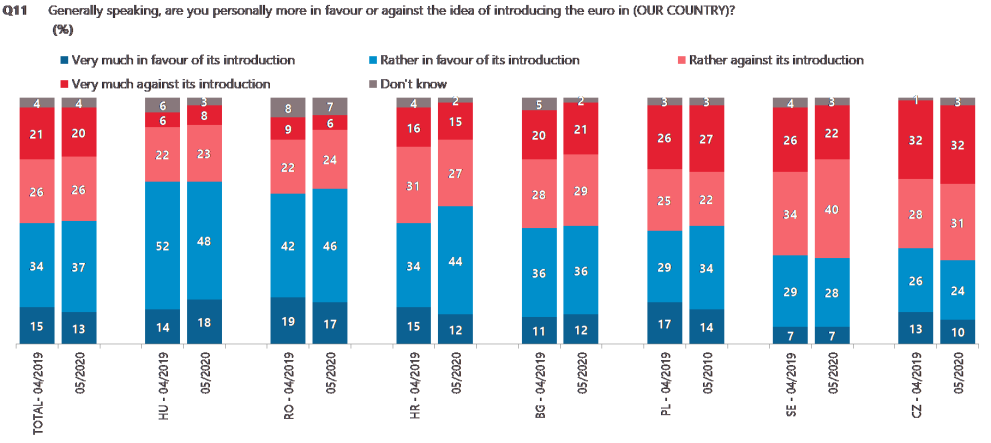This view is most strongly held in Hungary (68%), Romania (61%), Poland (57%), Croatia (54%) and Bulgaria (54%), and to a lesser extent o in Czechia (47%) and Sweden (45%).
… but views vary widely on introducing the euro in the respondents’ own country
There is again an almost even split on whether respondents are personally in favour of introducing the euro in their own country. Public support for introducing the euro across the 7 non-euro area countries now stands at 50%, one percentage point higher than in 2019, with considerable differences across individual countries.

The share of respondents who want the euro to be introduced in their country increased most in Croatia (+7 percentage points) while it decreased most in Czechia (-5pp). A majority of respondents in Hungary (66%), Romania (63%) and Croatia (56%) is in favour of introducing the euro, while a majority of 63% is against in Czechia and of 62% in Sweden. In Bulgaria and Poland, 48% are in favour while 50% and 49% respectively are against introducing the euro.
Analysis of the data shows that respondents who feel informed about the euro are more likely to support its introduction (57% compared with 44% of those who do not feel informed). Overall 51% feel informed about the euro, while 47% do not. The most notable change since the 2019 survey has been an increase in Poland of citizens feeling informed (+7 pp) to 53% now. There have also been substantial increases of five percentage points since 2019 both in Bulgaria (to 45%) and Croatia (to 52%), while 54% in Bulgaria and 47% in Croatia (both -5pp) do not feel informed.
… and prevail on their own country not being ready
The feeling of not being ready, however, remains strong in all seven countries. Over the last year, however, the feeling has decreased considerably in Croatia by eight percentage points to now 64% and by six percentage points in Poland to 76%. In Bulgaria, the feeling decreased by two points to now 69%. In contrast, this feeling has risen in Romania by 6 points to 62%. Now, 71% of respondents across all seven Member States do not think their country is ready for introducing the euro, while 24% think they are.
While more respondents in Sweden (56%) believe that their country is unlikely to ever adopt the euro, a five-year timeframe for euro adoption was seen as most likely by 66% of respondents in Croatia (+8pp), 59% in Bulgaria (+10pp) and 41% in Romania (unchanged). By contrast, a 10-year time frame was seen as most likely in Hungary (43%), Poland (42%) and Czechia (34%).
Slightly more respondents felt that they would personally benefit rather than lose out from their country’s adoption of the euro (47% vs. 42%), with the highest improvement in Croatia by eight percentage points to 53%. Overall however, more respondents thought that the euro would have negative rather than positive consequences for their countries (stable at 47% vs 45%). Nevertheless, in Hungary (55%) and Romania (51%), a clear majority of respondents expected positive consequences for their country. In Croatia, this view strengthened by eight percentage points to now 47%, while it strengthened by three points in Bulgaria to now 43%.
The Eurobarometer survey was conducted between 26 May and 3 June and involved over 7000 telephone interviews.
Documents
Details
- Publication date
- 31 July 2020
- Location
- Brussels
